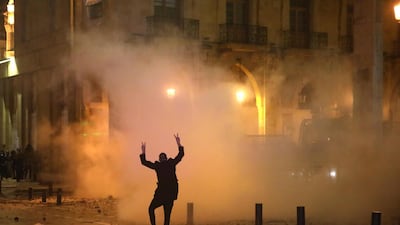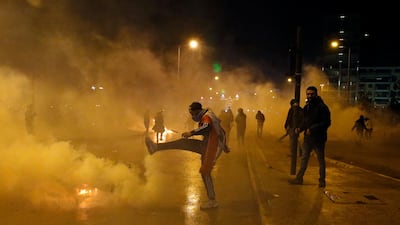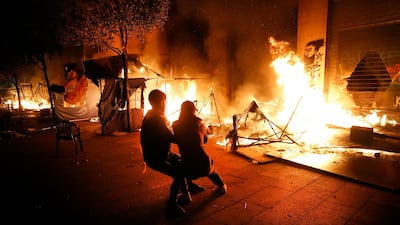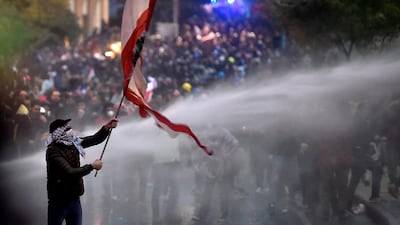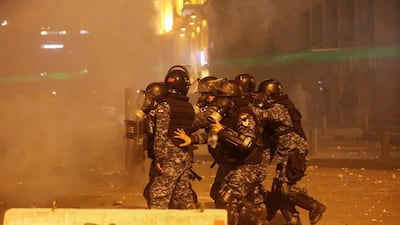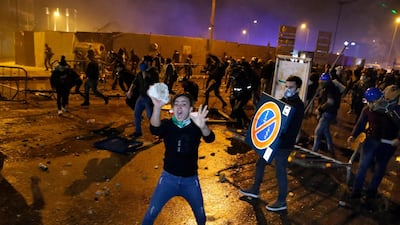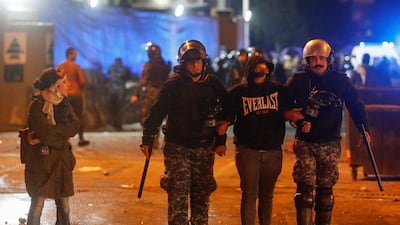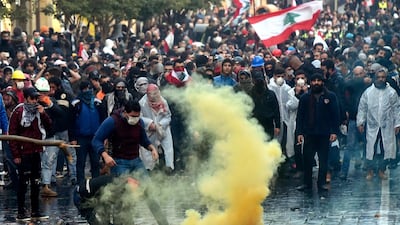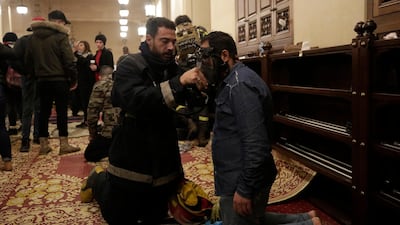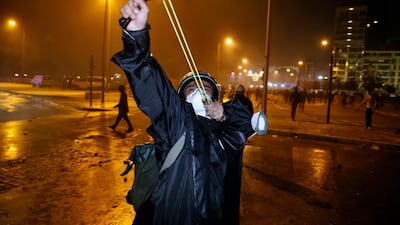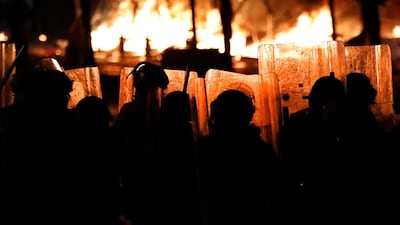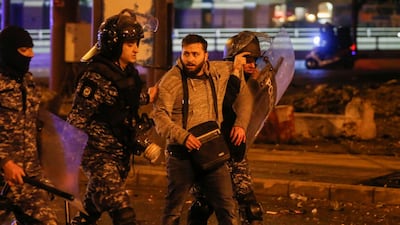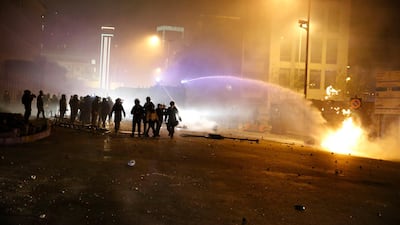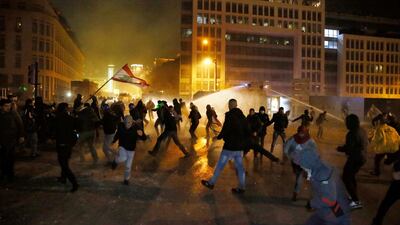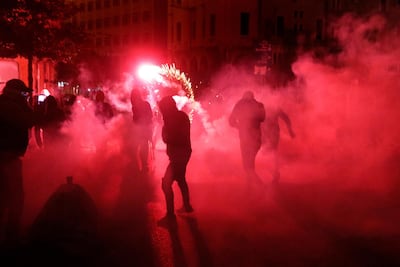Security forces fired tear gas, water cannons and rubber bullets in clashes on Sunday with hundreds of anti-government protesters outside Lebanon’s Parliament, as violence continued in a week of unrest.
At least 114 people were injured in the protests, according to the Red Cross and the Lebanese Civil Defense, with 47 taken to hospitals. Most of the wounds were from rubber bullets, some in the face and upper body, the Associated Press reported.
Late on Sunday night, security forces and army troops were deployed in large formations to the blocked streets in the Lebanese capital, before protesters retreated and the situation calmed.
Earlier that day, a Lebanese State Prosecutor ordered the release of 34 protesters detained late on Saturday during the violent protests.
The arrests came after Lebanon's President Michel Aoun asked the army and security commanders to restore calm in central Beirut where security forces clashed with protesters on Saturday night.
Mr Aoun called on them "to protect the safety of peaceful protesters and of public and private property, and to restore calm to central Beirut", the president's office said.
The state-run National News Agency reported the release order from Judge Ghassan Oueidat adding that most of the detained were being held in the Helou Barracks in southern Beirut.
On Saturday evening, protesters threw rocks and fireworks at police who responded with rubber bullets, water cannons and teargas. Officers pushed protesters back from near Parliament in downtown Beirut, using batons and sticks before making dozens of arrests.
At least 377 people were injured in the clashes on Saturday, including according to the Red Cross and the Lebanese Civil Defense. More than 120 of those were treated in hospitals, including a protester who sustained an eye injury, as well as security force members. The clashes also took place in the courtyard and steps of a mosque downtown. The top Muslim Sunni Fatwa office called it “inappropriate” and said protesters had
Tear gas and smoke filled central Beirut on Saturday night as hundreds of protesters faced off with police around Parliament, which has been sealed off with fencing and by riot police. Protesters threw fireworks and rocks at police who responded with tear gas and water cannon, and also threw rocks back at them.
Caretaker Prime Minister Saad Hariri called the scenes "crazy" and "unacceptable" as he gave a warning that "Beirut will not be an arena for mercenaries and the deliberate attacks on the peaceful popular movements". He called on the security forces to protect the capital and restore calm.
In scenes reminiscent of riots against banks in a commercial street on Tuesday night, protesters vandalised ATMs and parking meters near Parliament, smashing them with metal rods.
Shortly after the clashes erupted, dozens of young men took refuge in the upscale Beirut Souks mall, where all the shops were closed. Some broke cement slabs covering a high-end fashion store to use as projectiles against the police as they hurled insults towards caretaker Interior Minister Raya Al Hassan.
The sound of ambulance sirens rang out across Beirut as the Red Cross reported 80 wounded people had been taken to hospital and 140 more were treated on site.
Eyes running from the tear gas, Rabih Ezzedine, 21, said that they wanted to break past the riot police blocking the street to Parliament.
"We want a Cabinet of people who have no links with political parties. But they [politicians] are ignoring us," he told The National. Like other protesters, he believes that despite prime minister-designate Hassan Diab's statements, the new government that he is setting up will not be fully independent.
By early evening, police had pushed protesters back from the road leading between the entrance to Nijmeh Square where the parliament building and Beirut Souks are located.
But protesters remained in central Beirut, clashing with authorities in the most intense evening of violence in Lebanon since the start of the nationwide mass uprising against an economic crisis and mismanagement by the government.
Protesters were equipped for violence, wearing sophisticated gas masks and motorbike helmets. Many claimed to come from other regions of Lebanon.
In videos circulating online of the confrontation near parliament, protesters were heard chanting "shabiha" at police. The term refers to the violent pro-Damascus militias in the neighbouring Syrian conflict who are responsible for some of the attacks on demonstrators in the early days of the uprising in 2011 as well as for grisly tactics during the ensuing civil war.
Local television broadcast live footage of a mob of protesters attacking an isolated policeman. Two men dragged him out and ran away, leaving him lying on the road before other riot police helped him up.
Anger increased after the Internal Security Forces entered Al Amin mosque, the biggest mosque in downtown Beirut where injured protesters, women and children had taken refuge.
Although the protests led to the resignation of Mr Hariri’s government two weeks after it began, Mr Diab has yet to form a new administration despite reports he was close over the last two days.
Protesters are angered by the worst economic crisis since the end of the 1975-90 civil war that has seen banks impose capital controls to prevent withdrawals of more than a few hundred dollars a week and the Lebanese pound plummet in value on the black market despite it being officially pegged to the US dollar.
In the chaos in central Beirut on Saturday night, protest tents that were put up in above the central Martyrs' Square, the epicentre of the movement, were set on fire.
While there were reports members of the ISF or Parliamentary Police were responsible, both forces denied that their officers were involved.
Civil Defence teams moved in to extinguish the blaze as riot police used water cannon to put out rubbish-bin fires and barricades that had been set alight.
The ISF said on Saturday evening that officers injured in the clashes were later attacked in hospital. The force said the incidents took place at the American Hospital of Beirut in the western Hamra area as well as the Hospital Wardieh in east Beirut's Gemmayzeh.
Police wielding batons and firing tear gas have wounded dozens of people at protests in recent days, alarming human rights groups. Anger at the banks — which have curbed people's access to their savings — boiled over, with protesters smashing bank facades and ATMs on Tuesday.
On Saturday, local televisions broadcast images of protesters injured by rubber bullets.
“Riot police firing rubber bullets on protesters indiscriminately, incl while running away. UN standards state that such weapons should only be used on abdomen/legs of violent individual & only with view to addressing imminent threat of injury to police or public,” tweeted Human Rights Watch Lebanon researcher Aya Majzoub.
During the weekend, the protests swelled in size as thousands took to the streets.
At least three large marches set off around the capital to converge on parliament on Saturday afternoon, demanding the formation of a nonsectarian, non-political government capable of tackling the country's economic woes.
The protests have deeply divided the Lebanese, with Iran-backed Hezbollah and its allies accusing them of destabilising the country while their supporters believe that a deep political change is necessary.
This is reflected in local media coverage. On Saturday evening, NBN, a television station affiliated to Hezbollah’s political ally Amal, called protesters “infiltrators”, while Al Jadeed’s reporter asked those being dragged away by riot police to shout their names to the camera so that their relatives would be informed of their arrest.
